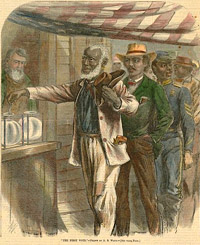
History, Department of
Digital Legal Research Lab
The Digital Legal Research Lab is an interdisciplinary hub for the social scientific study of law in the United States. Our team explores legal mobilization among marginalized actors and uses digital tools to offer quantitative and qualitative analysis of the law. Building an interactive and relational database of historic cases, our lab is committed to training undergraduates in critical legal inquiry, archival research methods, data collection and processing, and in transcription and encoding techniques that allow us to demonstrate patterns and strategies in legal mobilization and legal decision making. Vital to legal scholars and practitioners interested in concepts of justice, liberty, and due process, the database features thousands of previously unpublished cases that are central to the American legal tradition.
2024
Maternal Chains: Black Women's Legal Battles for Freedom in Pre-Emancipation America, Roshawnna Brinkley
"Huddled Masses:" The Immigration Act of 1917 in Habeas Corpus, Chikamso Chijioke
From Moral Panic to Legal Injustice: Due Process Failures in Prostitution Cases (1889-1924), Ethan Dunn
Sexual Surveillance: Morality Policing of Greeks and Italians in the Early 20th Century, Isabella Ferrell
To Have and To Hold: Habeas Corpus and the Mobilization of Female Petitioners, 1832–1924, Miranda Martinez
Writ to Work: Habeas Corpus Challenges by Laborers and Socialists in Washington State, 1915-1919, Luke McDermott
Equal Protection of Life, Liberty, and Labor: Habeas Corpus & the 14th Amendment, 1901–1904, Madison Mendiola
The Harding Brothers and Underage Enlistment in the Age of American Expansion, 1851–1857, Ryan Minton
Legal Proxies and Advocates: Exploring Inter-case Relationships in 19th- and 20th-Century Habeas Corpus, Ethan Reiter
Profiled Pickpockets: Seattle's Black Community & 1890s Habeas Mobilization, Zoë Williams
2023
Habeas at Home and Heart: Progressive Era Cases of Spousal Confinement to Nebraska's Psychiatric Households, Isabelle Childs
"The Best Interests of the Child:" Parental Claims in Nebraska Child Custody Cases, 1877–1924, Esme Krohn
One Among Many: Charlotte Kolmitz, Assistant U.S. Attorney in Seattle, 1918–1925, Anna Synya
2022
Legal Strategies Used by Black Men During the Antebellum Period, A. D. Banse
Habeas Corpus: Breaking Reservation Boundaries, Samantha Byrd
Habeas Corpus as a Means for Economic Freedom in the Progressive Era, Janana Khattak
A Home Shielded by Laws: Freedom Suits and Enslaved Mothers, Heidi Martin
In the Waiting: The Role of the Slave Bastille in Antebellum D.C., Ellyzabeth Morales-Ledesma

